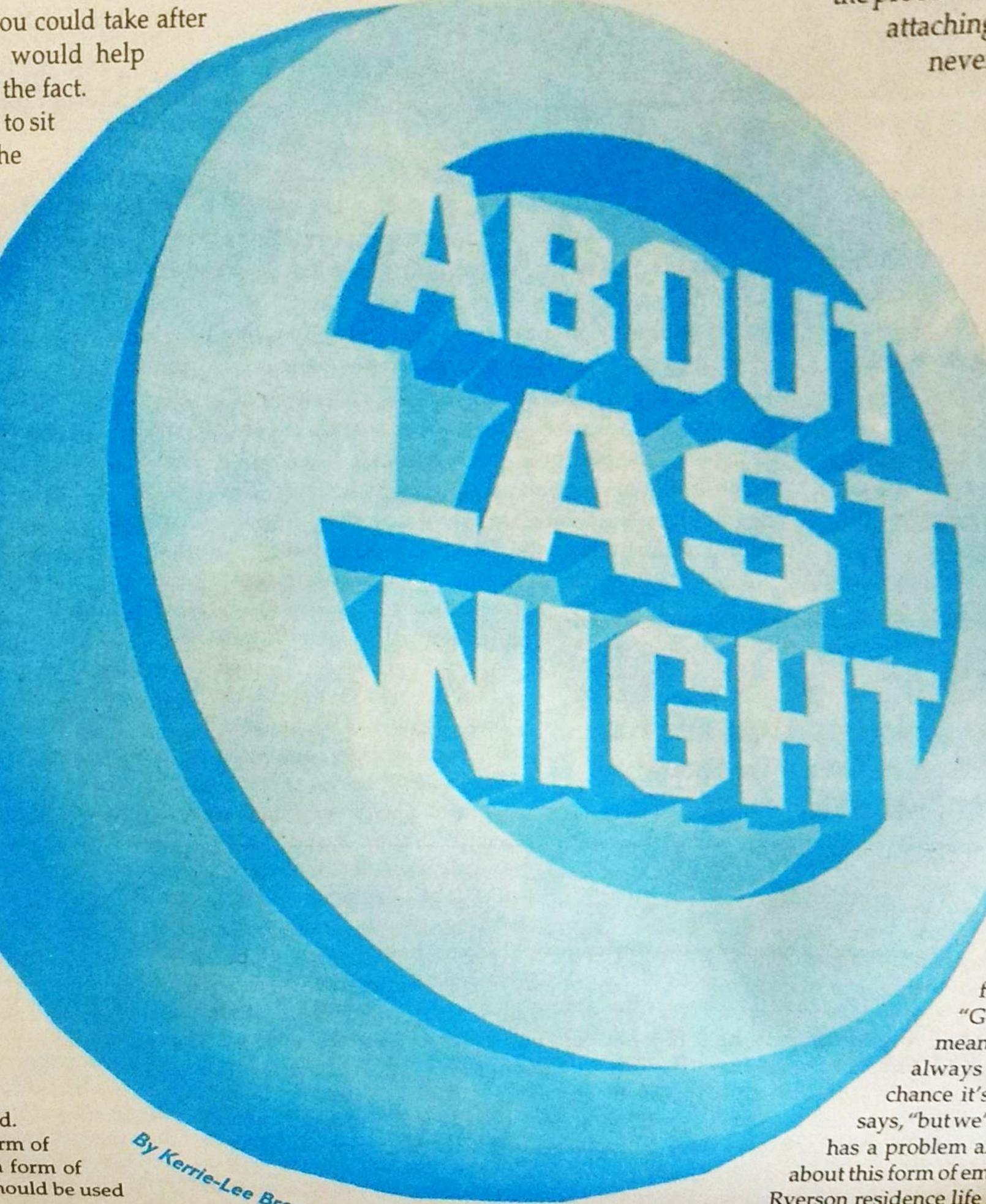By Kerrie-Lee Brown
Imagine you and your partner are having sex when the condom breaks or slips off. Did you forget to take your regular birth control as well? What is your first thought? Pregnancy? Maybe. Maybe not.
But if it is, you will most likely spend the next morning wondering if you are pregnant. You will worry like a mad woman for the next few hours. You are concerned about what your parents would say, what your friends would say and not to mention that fact that you might have to drop out of school. You can’t even support yourself right now — let alone a baby. What do you do?
Laila, a first-year Ryerson fashion student is terrified of being pregnant after an evening of drinking and partying — and a one-night stand. She wakes up in the morning to find herself half-dressed, laying in her own bed, empty beer bottles scattered throughout her room. She doesn’t even know the guy she brought home. She doesn’t remember much about the night at all.
All she knows was that she had not been on any sort of birth control pill for a long time.
Laila had heard about a pill you could take after having unprotected sex which would help protect her from pregnancy after the fact.
The nurse at the clinic told her to sit down, be calm and wait for the doctor to call her in. While she waits, Laila picks up a pamphlet on the table about safe sex. Is it too late? Finally, the doctor calls her into her office and asks about her situation. Laila tells the doctor about the beer, the guy, the bed and the condom. The doctor tells her to listen to the numerous options young women have when dealing with unprotected sexual encounters.
One option available is the emergency contraceptive pill (ECP) which must be taken within 72 hours of having unprotected intercourse. The doctor says by taking the so-called morning after pill, there is a good chance pregnancy will be prevented. But, physicians stress that this form of emergency contraception if not a form of regular birth control and that it should be used only in emergencies.
Laila listens to what the doctor has to say about ECP and about how Toronto is trying to promote the use of emergency contraceptive pills to young women.
Almost 4,000 teenagers in Metro become pregnant in an average year and 65 percent of these pregnancies end in abortion. Women aged 20 to 24 have the highest rate of abortion of all age groups with more than 5,000 abortions each year. The fear of unwanted pregnancy often brings a time of crisis for women and physicians are frequently the first professional they turn to for advice on their options. However, studies show that many physicians and patients have limited knowledge of emergency contraception.
The Toronto Public Health Department is hoping to change this through a $50,000 public information campaign this month aimed at young women aged 17 to 24. Toronto is promoting the Morning After Pill among young adults, schools, universities, educators and physicians, even though this emergency contraceptive pill has been around for years.
The emergency contraceptive pill is available at birth control clinics, in emergency rooms at hospitals, at walk-in clinics and sometimes from family doctors. Unfortunately, a lot of women who need it don’t know about it.
The emergency contraceptive pill consists of an oral contraceptive, or birth control pill, taken in a larger than normal dose. ECP has a higher dose of estrogen and progesterone than a regular birth control pill.
Here’s how it works — two pills are taken as soon as possible after intercourse, and then another two are taken 12 hours later (ECP can be taken up to 72 hours after unprotected sex and have a proven efficacy rate of 75 to 98 per cent).
After taking the pill, Laila experienced spotting for the next few days, cramps, diarrhoea and nausea. These side effects are only temporary. The doctor also gives her two Gravol to be taken with the second dose, to ease her stomach.
The first night for Laila is horrible though. “I puked all night long.”
The pill also causes her period to be more intense than usual. It lasts longer, is heavier. Her cramping is especially painful.
At the official launch of the emergency contraception pill, Dr. David McKeown, Toronto’s Medical Officer of Health, stresses that these pills are not intended as a replacement to other forms of regular contraception. “We have to break the silence that surrounds this safe, effective method of emergency contraception.”
In the past, some doctors have been reluctant to prescribe ECP partly because there were no practice guidelines for the oral contraceptive in emergency situations. However, the Public Health Department is sending a package of ECP guidelines and a letter of explanation on the current campaign to all Toronto-area doctors and university health centres. There are also over 2,000 posters in the city’s transit system including buses, subways, streetcars and 40 bus shelters.
While some people criticize the emergency contraceptive pill, mistakenly thinking it is a kind of abortion, Dr. Marion Powell of the Planned Parenthood Program says it keeps women from having to seek an abortion. She says that ECP is birth control rather than abortion because it disrupts the process of fertilization and prevents the egg from attaching itself in the first place, so pregnancy never occurs.
Dr. Miriam Kaufman of the Hospital For Sick Children also says that ECP is very safe. The only way ECP could be harmful for a woman would be if she had breast cancer, ovarian cancer or blood clots. So far, the American College of Physicians has had no reports of major cardiovascular or neurological side effects from ECP, although clinics and doctors warn their patients that if the pregnancy goes to term, there is not guarantee that the fetus will be 100 per cent healthy due to the high dose of hormones the fertilized egg would have been exposed to.
Dr. Karen Tu of the Ryerson Health Centre says they have been providing ECP to students for at least six years. “Generally, it’s not a good means of birth control… there’s always a two to five per cent chance it’s not going to work,” Tu says, “But we’re always here if someone has a problem and wants to know more about this form of emergency contraception.”
Ryerson residence life facilitator, Lisa Nassim, says if a student has a concern about emergency birth control methods, she would refer them to health services or counselling services. There are always questions about sexual activity on campus, but her major concern is whether the student gets the counselling help or medical attention needed. She makes sure that all RAs and peer supporters have the right information about emergency situations and about the various options available on campus.
Laila says the Bay Centre for Birth Control doctor is very helpful when answering her questions about ECP. Her doctor says some Ryerson students visit clinics instead of services on campus because they are worried that everyone else will find out about their choices. Most women want to keep this decision to themselves, and figure paying $12 to $16 up front in an anonymous setting is worth it.
Dr. Powell says there’s no difference between having a condom machine in a bathroom and a morning after pill machine. She feels that EXP is the answer to the worrisome decisions women have had to face over the years. Studies show the abortion rate will decrease due to more and more young women using emergency contraception.
Laila says she doesn’t regret taking ECP after her night last September, but she would never put herself in that situation again. She says the panic and worry after taking the first pill is too much to handle, and anticipating her next period made her crazy.
When she hears people talking about the moral aspects of using the morning after pill now she just thinks about what the doctor at the clinic told her. “It’s an option more and more women are deciding to chose today, which you can take before pregnancy occurs, rather than during pregnancy which often results in abortion.” Laila says she can’t speak for anyone else, but she knows that her choice was an informed one.












Leave a Reply